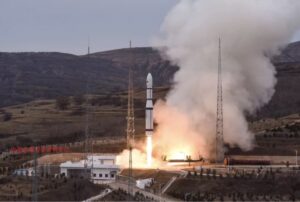Shanghai signs agreement with China’s megaconstellation group, aims to foster commercial space hub
Thursday, 17 February 2022 10:31
Shanghai local government entered an agreement with the state company responsible for China’s planned broadband megaconstellation Wednesday, while also aiming to foster a space hub to support reusable rockets and satellite mass production.
ESA to set up committee to study human space exploration options
Thursday, 17 February 2022 09:21
The European Space Agency will establish a committee with representatives from both inside and outside the space industry to develop options for a European human space exploration program.
The post ESA to set up committee to study human space exploration options appeared first on SpaceNews.
Gaia reveals a new member of the Milky Way family
Thursday, 17 February 2022 07:00 Image:
Image:
Our galaxy, the Milky Way, began forming around 12 billion years ago. Since then, it has been growing in both mass and size through a sequence of mergers with other galaxies.
Perhaps most exciting is that this process has not quite finished, and by using data from ESA’s Gaia spacecraft, astronomers can see it taking place. This in turn allows to reconstruct the history of our galaxy, revealing the ‘family tree’ of smaller galaxies that has helped make the Milky Way what it is today.
The latest work on this subject comes from Khyati Malhan, a Humboldt Fellow at the
How to design a sail that won't tear or melt on an interstellar voyage
Thursday, 17 February 2022 04:47 Astronomers have been waiting decades for the launch of the James Webb Space Telescope, which promises to peer farther into space than ever before. But if humans want to actually reach our nearest stellar neighbor, they will need to wait quite a bit longer: a probe sent to Alpha Centauri with a rocket would need roughly 80,000 years to make the trip.
Igor Bargatin, Associate Professor in t
Astronomers have been waiting decades for the launch of the James Webb Space Telescope, which promises to peer farther into space than ever before. But if humans want to actually reach our nearest stellar neighbor, they will need to wait quite a bit longer: a probe sent to Alpha Centauri with a rocket would need roughly 80,000 years to make the trip.
Igor Bargatin, Associate Professor in t Aerojet Rocketdyne positioned to continue driving growth, profitability and value creation
Thursday, 17 February 2022 04:47 Aerojet Rocketdyne Holdings, Inc. has reaffirmed its strong foundation for substantial value creation following the termination of its merger agreement with Lockheed Martin Corporation. The Company issued the following statement:
We are poised to deliver substantial value to our shareholders driven by our continued leadership in key space exploration and defense growth markets, including b
Aerojet Rocketdyne Holdings, Inc. has reaffirmed its strong foundation for substantial value creation following the termination of its merger agreement with Lockheed Martin Corporation. The Company issued the following statement:
We are poised to deliver substantial value to our shareholders driven by our continued leadership in key space exploration and defense growth markets, including b Digi-Key to distribute EPC Space Rad Hard devices worldwide for space applications
Thursday, 17 February 2022 04:47 EPC Space has announced that Digi-Key Electronics will be a global distributor for EPC Space's line of radiation hardened (rad hard) GaN-on-silicon transistors and ICs, packaged, tested, and qualified for satellite and high-reliability applications.
Spanning a range of 40 V to 300 V, EPC Space offers a family of rad hard enhancement mode power transistors. These power transistors demonstra
EPC Space has announced that Digi-Key Electronics will be a global distributor for EPC Space's line of radiation hardened (rad hard) GaN-on-silicon transistors and ICs, packaged, tested, and qualified for satellite and high-reliability applications.
Spanning a range of 40 V to 300 V, EPC Space offers a family of rad hard enhancement mode power transistors. These power transistors demonstra Vaya Space completes first suborbital test flight
Thursday, 17 February 2022 04:47 Vaya Space announced the successful launch of its hybrid rocket from Mojave, California on January 29th, 2022 operating under an existing FAA waiver. The suborbital flight demonstrated its hybrid rocket design using 3D printed fuel grains created from recycled thermoplastics. This launch paves the way for rapid acceleration of Vaya Space's go-to-market strategy as the Company scales for producti
Vaya Space announced the successful launch of its hybrid rocket from Mojave, California on January 29th, 2022 operating under an existing FAA waiver. The suborbital flight demonstrated its hybrid rocket design using 3D printed fuel grains created from recycled thermoplastics. This launch paves the way for rapid acceleration of Vaya Space's go-to-market strategy as the Company scales for producti Sols 3388-3390: Pediment Passage
Thursday, 17 February 2022 04:47 Curiosity is advancing westward through a largely boulder-strewn channel that is leading us toward the Greenheugh Pediment. The Pediment is where our rover will spend the next many months, as we turn back uphill to the south and continue our ascent up Mt. Sharp. Despite it being quite craggy in our current location, we did have to drive over a large sand patch to get to our current parking locat
Curiosity is advancing westward through a largely boulder-strewn channel that is leading us toward the Greenheugh Pediment. The Pediment is where our rover will spend the next many months, as we turn back uphill to the south and continue our ascent up Mt. Sharp. Despite it being quite craggy in our current location, we did have to drive over a large sand patch to get to our current parking locat Testing rocks on Earth to help NASA's Perseverance work on Mars
Thursday, 17 February 2022 04:47 When NASA's Perseverance Mars rover tried to collect its first rock core sample last August, the outcome presented a puzzle for the mission team: The rover's sample tube came up empty. But why?
Not long after, Perseverance successfully gathered a sample the size of a piece of chalk from a different rock. The team concluded that the first rock they had chosen was so crumbly that the rover's
When NASA's Perseverance Mars rover tried to collect its first rock core sample last August, the outcome presented a puzzle for the mission team: The rover's sample tube came up empty. But why?
Not long after, Perseverance successfully gathered a sample the size of a piece of chalk from a different rock. The team concluded that the first rock they had chosen was so crumbly that the rover's JILA atomic clocks measure Einstein's general relativity at millimeter scale
Thursday, 17 February 2022 04:47 JILA physicists have measured Albert Einstein's theory of general relativity, or more specifically, the effect called time dilation, at the smallest scale ever, showing that two tiny atomic clocks, separated by just a millimeter or the width of a sharp pencil tip, tick at different rates.
The experiments, described in the Feb. 17 issue of Nature, suggest how to make atomic clocks 50 times
JILA physicists have measured Albert Einstein's theory of general relativity, or more specifically, the effect called time dilation, at the smallest scale ever, showing that two tiny atomic clocks, separated by just a millimeter or the width of a sharp pencil tip, tick at different rates.
The experiments, described in the Feb. 17 issue of Nature, suggest how to make atomic clocks 50 times NASA's IXPE sends first science image
Thursday, 17 February 2022 04:47 In time for Valentine's Day, NASA's Imaging X-Ray Polarimetry Explorer which launched Dec. 9, 2021, has delivered its first imaging data since completing its month-long commissioning phase. All instruments are functioning well aboard the observatory, which is on a quest to study some of the most mysterious and extreme objects in the universe.
IXPE first focused its X-ray eyes on Cassiopeia
In time for Valentine's Day, NASA's Imaging X-Ray Polarimetry Explorer which launched Dec. 9, 2021, has delivered its first imaging data since completing its month-long commissioning phase. All instruments are functioning well aboard the observatory, which is on a quest to study some of the most mysterious and extreme objects in the universe.
IXPE first focused its X-ray eyes on Cassiopeia Psyche, the iron giant of asteroids, may be less iron than researchers thought
Thursday, 17 February 2022 04:47 The asteroid 16 Psyche, which NASA intends to visit with a spacecraft in 2026, may be less heavy metal and more hard rock than scientists have surmised, according to a new study by researchers from Brown and Purdue universities.
Psyche, which orbits the sun in the asteroid belt between Mars and Jupiter, is the largest of the M-type asteroids, which are composed chiefly of iron and nickel a
The asteroid 16 Psyche, which NASA intends to visit with a spacecraft in 2026, may be less heavy metal and more hard rock than scientists have surmised, according to a new study by researchers from Brown and Purdue universities.
Psyche, which orbits the sun in the asteroid belt between Mars and Jupiter, is the largest of the M-type asteroids, which are composed chiefly of iron and nickel a Studying the next interstellar interloper with Webb
Thursday, 17 February 2022 04:47 One of the most exciting findings in planetary science in recent years is the discovery of interstellar objects passing through our solar system. So far, astronomers have confirmed only two of these interlopers from other star systems - 1I/'Oumuamua in 2017 and 2I/Borisov in 2018 - but many, many more are thought to exist. Scientists have had only limited ability to study these objects once disc
One of the most exciting findings in planetary science in recent years is the discovery of interstellar objects passing through our solar system. So far, astronomers have confirmed only two of these interlopers from other star systems - 1I/'Oumuamua in 2017 and 2I/Borisov in 2018 - but many, many more are thought to exist. Scientists have had only limited ability to study these objects once disc Quantum tech in space?
Thursday, 17 February 2022 04:47 Operating quantum technology in challenging environments, such as space, has moved a significant step forward after physicists working at the University of Sussex have developed a monitoring and control system blueprint for quantum devices and experiments.
The system is presented in a peer reviewed paper published in Quantum Science and Technology. The paper details how the University's Qu
Operating quantum technology in challenging environments, such as space, has moved a significant step forward after physicists working at the University of Sussex have developed a monitoring and control system blueprint for quantum devices and experiments.
The system is presented in a peer reviewed paper published in Quantum Science and Technology. The paper details how the University's Qu Homegrown spacecraft is putting Perth on Space Race map
Thursday, 17 February 2022 04:47 Perth researchers made history when they sent the first WA designed and built satellite into space last year.
The Binar-1 - named after the Noongar word for fireball - was developed by Curtin University's Space Science and Technology Centre.
The Binar Space Program team plan to deploy six more locally made satellites in the next 2 years.
So why is WA launching satellites and wh
Perth researchers made history when they sent the first WA designed and built satellite into space last year.
The Binar-1 - named after the Noongar word for fireball - was developed by Curtin University's Space Science and Technology Centre.
The Binar Space Program team plan to deploy six more locally made satellites in the next 2 years.
So why is WA launching satellites and wh 
